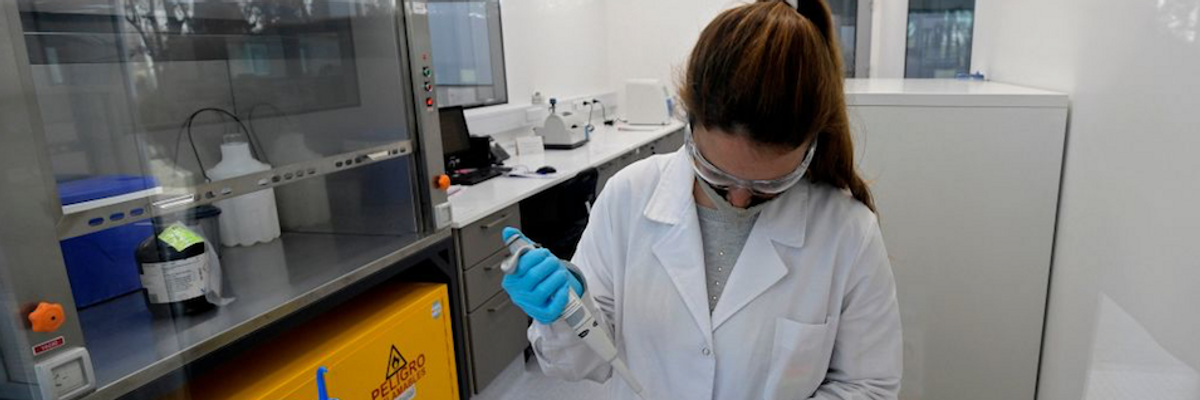A World Health Organization spokesperson said on Friday that widespread vaccination against Covid-19 is not expected until mid-2021, a statement that stood in stark contrast with President Donald Trump's recent claim that a vaccine could be ready by the November general election.
Speaking at a United Nations briefing in Geneva, WHO spokesperson Margaret Harris said that none of the candidate vaccines currently in advanced clinical trials has shown "a clear signal" of being at least 50% effective, the minimum level of acceptability according to many scientists.
"We are really not expecting to see widespread vaccination until the middle of next year," said Harris, who explained that "phase three [clinical trials] must take longer because we need to see how truly protective the vaccine is and we also need to see how safe it is."
"A lot of people have been vaccinated and what we don't know is whether the vaccine works," she added. "At this stage we do not have the clear signal of whether or not it has the level of worthwhile efficacy and safety."
Harris' remarks stood in contrast to an August 6 claim by Trump that a Covid-19 vaccine could be available by early November. Experts have repeatedly countered that an effective vaccine would take until at least the middle of next year to develop, produce and distribute. Dr. Walter Orenstein, associate director of the Emory Vaccine Center in Atlanta, said that vaccine development in less than a year would be a "miracle."
On Thursday, Dr. Moncef Slaoui, the administration's own chief vaccine adviser, toldNPR that it was "extremely unlikely" that a vaccine would be available as the "October surprise" Trump seeks to boost his reelection chances.
Medical experts and health officials have warned that the administration's politically motivated push to rush a Covid-19 vaccine to production before the presidential election, and its stated willingness to fast-track unproven experimental vaccines, poses serious public health risks.
On August 27, U.S. Centers for Disease Control and Prevention Director Robert Redfield sent a letter to state governors urging them to select and prepare locations for potential Covid-19 vaccine distribution on November 1. Officials in at least three states--California, New York, and Washington--have suggested they would refuse to distribute vaccines they deemed to be inadequately vetted or politically motivated
"If the U.S. FDA were to proceed with an abbreviated process and approve a vaccine through the Emergency Use Authorization I think that would raise concern," said Dr. Nirav Shah, director of the Maine Center for Disease Control and Prevention, on Thursday.
More than 170 nations are currently in talks to join the Covid-19 Vaccines Global Access (Covax) Facility, a WHO-led global initiative to fast-track development, production, and equitable worldwide distribution of a coronavirus vaccine. Covax aims to deliver two billion doses of vaccines by the end of 2021.
Conspicuously absent from the list of participating countries is the United States, as the Trump administration claimed on Tuesday that it "will not be constrained by multilateral organizations influenced by the corrupt World Health Organization and China."
Trump--who has been widely criticized for his handling of the pandemic in a nation that has by far suffered the most Covid-19 cases and deaths in the world--has long been at odds with the WHO. The president has called the agency "a puppet of China" and has claimed without evidence that it caved to pressure from Beijing "to mislead the world" about the nascent pandemic.
In July, Trump followed through on an earlier threat to withdraw from the WHO by formally notifying the agency that the U.S. would leave it in July 2021. The American Medical Association strongly opposed the move, calling it a "major setback to science, public health, and the global coordination of efforts needed to defeat Covid-19" and warning that it "puts the health of our country at grave risk."
Democratic presidential nominee Joe Biden responded to Trump's WHO withdrawal announcement by saying the U.S. would rejoin the the organization on his first day in office.
On Wednesday, the Trump administration announced it will not pay $80 million in WHO dues owed for 2019 and 2020 and will instead redirect the money to help pay its United Nations bill. Georgetown Law professor Lawrence Gostin slammed the move as "unethical... and patently unlawful."
